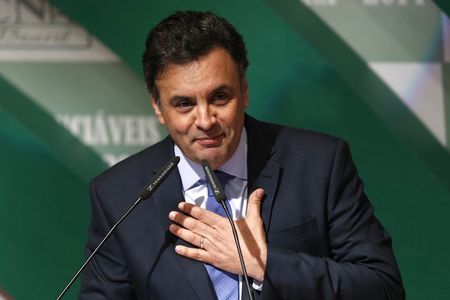Exclusive – Brazil’s Neves to allow currency to float freely if elected

By Jeferson Ribeiro
BRASILIA (Reuters) – If Aecio Neves wins the presidency this October, he would allow Brazil’s currency to float freely, leaving the market to set the exchange rate in a move that would likely help local industries struggling with a strong real.
Mansueto Almeida, a top economic adviser to the Neves campaign, told Reuters on Thursday that a free floating real will help restore balance to Brazil’s external accounts and make Brazilian manufacturers more competitive.
“If elected, a Neves government will aim to end the currency populism imposed by President Dilma Rousseff’s government and return to a free floating exchange rate,” Almeida said in a written statement in response to questions from Reuters.
Almeida is a member of the team of advisers led by former central bank governor Arminio Fraga that are coordinating the economic policy platform for Neves, who is Rousseff’s main challenger in the Oct. 5 presidential election.
Since last August, Brazil’s central bank has intervened daily in the foreign exchange market by selling currency swaps, derivatives designed to support the real. Many analysts say the central bank wants to avoid a sharp currency depreciation that would stoke already high inflation.
In June, the bank said it would extend the swap programme until at least the end of this year.
The intervention programme has turned the real into the best-performing major Latin America currency this year, even with some recent losses. Some of those losses came after Neves told an audience of industry leaders on July 30 that Brazil needs a weaker currency to make its economy more competitive in the global marketplace.
Industry and agribusiness leaders have called for a weaker currency to make Brazilian exports more competitive and boost investment in a flagging economy. Critics have accused the Rousseff administration of using the exchange rate as a monetary policy tool to contain inflation.
The left-leaning Rousseff remains the favourite to win a second term, though recent opinion polls point to a close race that looks almost certain to go to a second-round runoff against Neves, a centrist from the Brazilian Social Democracy Party.
Brazil’s economy has underperformed since Rousseff took office in 2011 despite repeated attempts to jump-start growth through tax cuts and other costly subsidies. Industrial output is set to shrink this year and remains below pre-2009 levels, hit by stubborn inflation and high labour costs.
Neves, a former state governor who has vowed to restore economic growth and investor confidence, hinted last week at what his exchange rate policy would look like.
“Brazil, unfortunately, is being held hostage to what we can call currency populism, because the government seeks to control inflation through permanent intervention in the foreign exchange market,” Neves told an industrial lobby in Brasilia.
Almeida, an economist with the government think tank IPEA, said a free floating real would improve Brazil’s trade balance and help reduce the current account deficit.
“The country’s external accounts would enter a virtuous circle, attracting more investment and improving the trade balance,” he said.
Brazil’s current account deficit is running at close to 4 percent of gross domestic product and will hit $80 billion by year end, he added.
“That’s a reflection of the imbalance caused by a real that has been artificially strengthened to contain inflation.”
(Writing by Anthony Boadle; Editing by Todd Benson and Meredith Mazzilli)